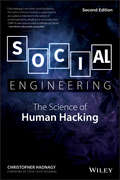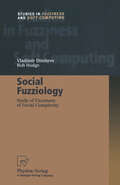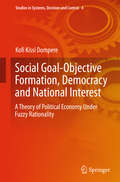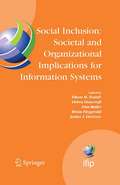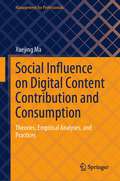- Table View
- List View
Social Engineering: The Science of Human Hacking
by Christopher HadnagyHarden the human firewall against the most current threats Social Engineering: The Science of Human Hacking reveals the craftier side of the hacker’s repertoire—why hack into something when you could just ask for access? Undetectable by firewalls and antivirus software, social engineering relies on human fault to gain access to sensitive spaces; in this book, renowned expert Christopher Hadnagy explains the most commonly-used techniques that fool even the most robust security personnel, and shows you how these techniques have been used in the past. The way that we make decisions as humans affects everything from our emotions to our security. Hackers, since the beginning of time, have figured out ways to exploit that decision making process and get you to take an action not in your best interest. This new Second Edition has been updated with the most current methods used by sharing stories, examples, and scientific study behind how those decisions are exploited. Networks and systems can be hacked, but they can also be protected; when the “system” in question is a human being, there is no software to fall back on, no hardware upgrade, no code that can lock information down indefinitely. Human nature and emotion is the secret weapon of the malicious social engineering, and this book shows you how to recognize, predict, and prevent this type of manipulation by taking you inside the social engineer’s bag of tricks. Examine the most common social engineering tricks used to gain access Discover which popular techniques generally don’t work in the real world Examine how our understanding of the science behind emotions and decisions can be used by social engineers Learn how social engineering factors into some of the biggest recent headlines Learn how to use these skills as a professional social engineer and secure your company Adopt effective counter-measures to keep hackers at bay By working from the social engineer’s playbook, you gain the advantage of foresight that can help you protect yourself and others from even their best efforts. Social Engineering gives you the inside information you need to mount an unshakeable defense.
Social Engineering: The Science of Human Hacking
by Christopher HadnagyHarden the human firewall against the most current threats Social Engineering: The Science of Human Hacking reveals the craftier side of the hacker’s repertoire—why hack into something when you could just ask for access? Undetectable by firewalls and antivirus software, social engineering relies on human fault to gain access to sensitive spaces; in this book, renowned expert Christopher Hadnagy explains the most commonly-used techniques that fool even the most robust security personnel, and shows you how these techniques have been used in the past. The way that we make decisions as humans affects everything from our emotions to our security. Hackers, since the beginning of time, have figured out ways to exploit that decision making process and get you to take an action not in your best interest. This new Second Edition has been updated with the most current methods used by sharing stories, examples, and scientific study behind how those decisions are exploited. Networks and systems can be hacked, but they can also be protected; when the “system” in question is a human being, there is no software to fall back on, no hardware upgrade, no code that can lock information down indefinitely. Human nature and emotion is the secret weapon of the malicious social engineering, and this book shows you how to recognize, predict, and prevent this type of manipulation by taking you inside the social engineer’s bag of tricks. Examine the most common social engineering tricks used to gain access Discover which popular techniques generally don’t work in the real world Examine how our understanding of the science behind emotions and decisions can be used by social engineers Learn how social engineering factors into some of the biggest recent headlines Learn how to use these skills as a professional social engineer and secure your company Adopt effective counter-measures to keep hackers at bay By working from the social engineer’s playbook, you gain the advantage of foresight that can help you protect yourself and others from even their best efforts. Social Engineering gives you the inside information you need to mount an unshakeable defense.
Social Engineering in Cybersecurity: Threats and Defenses
by Dr Gururaj H L Dr Janhavi V Ambika VIn today’s digitally interconnected world, the threat landscape has evolved to include not just sophisticated technical exploits but also the art of human manipulation. Social engineering attacks have emerged as a formidable and often underestimated threat to information security. The primary aim of this textbook is to provide a comprehensive and in-depth exploration of social engineering attacks. The book seeks to equip cybersecurity professionals, IT practitioners, students, and anyone concerned with information security with the knowledge and tools needed to recognize, prevent, and mitigate the risks posed by social engineering. The scope of this textbook is broad and multifaceted. It covers a wide range of social engineering attack vectors, including phishing, vishing, pretexting, baiting, tailgating, impersonation, and more. Each attack vector is dissected, with detailed explanations of how they work, real-world examples, and countermeasures. Key Features • Comprehensive Coverage: Thorough exploration of various social engineering attack vectors, including phishing, vishing, pretexting, baiting, quid pro quo, tailgating, impersonation, and more. • Psychological Insights: In-depth examination of the psychological principles and cognitive biases that underlie social engineering tactics. • Real-World Case Studies: Analysis of real-world examples and high-profile social engineering incidents to illustrate concepts and techniques.• Prevention and Mitigation: Practical guidance on how to recognize, prevent, and mitigate social engineering attacks, including security best practices. • Ethical Considerations: Discussion of ethical dilemmas and legal aspects related to social engineering that emphasizes responsible use of knowledge. This comprehensive textbook on social engineering attacks provides a deep and practical exploration of this increasingly prevalent threat in cybersecurity. It covers a wide array of attack vectors, including phishing, vishing, pretexting, and more, offering readers an in-depth understanding of how these attacks work. The book delves into the psychology behind social engineering and examines the cognitive biases and emotional triggers that make individuals susceptible. Real-world case studies illustrate concepts and techniques while practical guidance equips readers with the knowledge to recognize, prevent, and mitigate social engineering threats.
Social Engineering in Cybersecurity: Threats and Defenses
In today’s digitally interconnected world, the threat landscape has evolved to include not just sophisticated technical exploits but also the art of human manipulation. Social engineering attacks have emerged as a formidable and often underestimated threat to information security. The primary aim of this textbook is to provide a comprehensive and in-depth exploration of social engineering attacks. The book seeks to equip cybersecurity professionals, IT practitioners, students, and anyone concerned with information security with the knowledge and tools needed to recognize, prevent, and mitigate the risks posed by social engineering. The scope of this textbook is broad and multifaceted. It covers a wide range of social engineering attack vectors, including phishing, vishing, pretexting, baiting, tailgating, impersonation, and more. Each attack vector is dissected, with detailed explanations of how they work, real-world examples, and countermeasures. Key Features • Comprehensive Coverage: Thorough exploration of various social engineering attack vectors, including phishing, vishing, pretexting, baiting, quid pro quo, tailgating, impersonation, and more. • Psychological Insights: In-depth examination of the psychological principles and cognitive biases that underlie social engineering tactics. • Real-World Case Studies: Analysis of real-world examples and high-profile social engineering incidents to illustrate concepts and techniques.• Prevention and Mitigation: Practical guidance on how to recognize, prevent, and mitigate social engineering attacks, including security best practices. • Ethical Considerations: Discussion of ethical dilemmas and legal aspects related to social engineering that emphasizes responsible use of knowledge. This comprehensive textbook on social engineering attacks provides a deep and practical exploration of this increasingly prevalent threat in cybersecurity. It covers a wide array of attack vectors, including phishing, vishing, pretexting, and more, offering readers an in-depth understanding of how these attacks work. The book delves into the psychology behind social engineering and examines the cognitive biases and emotional triggers that make individuals susceptible. Real-world case studies illustrate concepts and techniques while practical guidance equips readers with the knowledge to recognize, prevent, and mitigate social engineering threats.
Social Engineering Penetration Testing: Executing Social Engineering Pen Tests, Assessments and Defense
by Gavin Watson Andrew Mason Richard AckroydSocial engineering attacks target the weakest link in an organization's security human beings. Everyone knows these attacks are effective, and everyone knows they are on the rise. Now, Social Engineering Penetration Testing gives you the practical methodology and everything you need to plan and execute a social engineering penetration test and assessment. You will gain fascinating insights into how social engineering techniques including email phishing, telephone pretexting, and physical vectors can be used to elicit information or manipulate individuals into performing actions that may aid in an attack. Using the book's easy-to-understand models and examples, you will have a much better understanding of how best to defend against these attacks. The authors of Social Engineering Penetration Testing show you hands-on techniques they have used at RandomStorm to provide clients with valuable results that make a real difference to the security of their businesses. You will learn about the differences between social engineering pen tests lasting anywhere from a few days to several months. The book shows you how to use widely available open-source tools to conduct your pen tests, then walks you through the practical steps to improve defense measures in response to test results. - Understand how to plan and execute an effective social engineering assessment - Learn how to configure and use the open-source tools available for the social engineer - Identify parts of an assessment that will most benefit time-critical engagements - Learn how to design target scenarios, create plausible attack situations, and support various attack vectors with technology - Create an assessment report, then improve defense measures in response to test results
Social Entrepreneurship and Social Inclusion: Processes, Practices, and Prospects
by Rama Krishna KummithaThis book argues that embeddedness and community participation bring unique propositions for social entrepreneurship to foster social inclusion. It uncovers the role of local knowledge and grassroots level innovations to create necessary environment for the positive social change to roll. Social enterprises have proven to reduce drudgery of poor and excluded by offering creative and innovative solutions for long standing social problems. The grassroots level creative problem solving mechanisms they initiate travel through a variety of local dynamics and cultural contexts. However, social innovations quite often do not achieve their intended results, especially when they fail to understand the local contexts and embed themselves in such dynamism. In this background, the book attempts to understand and analyse the 'connect' between the social innovations and local dynamism. It argues that the community-driven innovation management which is based on local knowledge inspires the social entrepreneurial process and builds capacities and infrastructure to foster social inclusion. Each chapter in this book offers development scholars rich narration about how social problems have been approached, addressed, and altered through rich insights from communities and the social entrepreneurial teams.
Social Entrepreneurship and Social Inclusion: Processes, Practices, and Prospects
by Rama Krishna KummithaThis book argues that embeddedness and community participation bring unique propositions for social entrepreneurship to foster social inclusion. It uncovers the role of local knowledge and grassroots level innovations to create necessary environment for the positive social change to roll. Social enterprises have proven to reduce drudgery of poor and excluded by offering creative and innovative solutions for long standing social problems. The grassroots level creative problem solving mechanisms they initiate travel through a variety of local dynamics and cultural contexts. However, social innovations quite often do not achieve their intended results, especially when they fail to understand the local contexts and embed themselves in such dynamism. In this background, the book attempts to understand and analyse the 'connect' between the social innovations and local dynamism. It argues that the community-driven innovation management which is based on local knowledge inspires the social entrepreneurial process and builds capacities and infrastructure to foster social inclusion. Each chapter in this book offers development scholars rich narration about how social problems have been approached, addressed, and altered through rich insights from communities and the social entrepreneurial teams.
Social Fuzziology: Study of Fuzziness of Social Complexity (Studies in Fuzziness and Soft Computing #107)
by Vladimir Dimitrov Bob HodgeFuzziology studies the fuzziness inherent in what we know about ourselves, the sources and nature of our experience, our thoughts and feelings, drives for understanding and urges to create and realise our potential. This kind of fuzziness is at the core of our existence, at the essence of our humanness. It affects any field of human activity, be it mathematical study of fuzzy equations and fuzzy integrals; engineering design and implementation of fuzzy logic-based methodologies; fuzzy control systems or fuzzy robots. Social fuzziology investigates the role of fuzziness in understanding the dynamic complexity of human existence in the social world. It is a study of the nexus between the complex demands of life -individual and social -and the fuzziness of thinking. Since human evolution over 2 billion years has seen the co-evolution of social complexity with human language and thought, it is likely that the fuzziness of language and thought is especially intimately formed by the demands of social complexity, just as social complexity is sustained by the inherent fuzziness of language and thought. Social fuzziology is not simply one field of application of fuzziology. Given the initial state of the development of fuzziology, social fuzziology needs to develop hand in hand with fuzziology, each helping to advance the other.
Social Goal-Objective Formation, Democracy and National Interest: A Theory of Political Economy Under Fuzzy Rationality (Studies in Systems, Decision and Control #4)
by Kofi Kissi DompereThis book presents the development of a theory of social goal-objective formation and its relationship to national interest and social vision under a democratic decision-choice system with imperfect information structure. It provides a framework for the application of fuzzy logic and its mathematics to the analysis in resolving conflicts in individual preferences in the collective decision-choice space without violence. The book demonstrates how to use fuzzy logic and its mathematics in the study of economics, social sciences and other complex systems. It also presents the use of collaborative tools of opposites, duality, polarity, continuum in fuzzy paradigm with its logic, laws of thought and mathematics in developing a new approach to the theory of political economy in order to enhance the constructs of social decision-choice theory.
Social goes Mobile - Kunden gezielt erreichen: Mobile Marketing in Sozialen Netzwerken
by Heike ScholzIn diesem Buch erläutern ausgewiesene Digital-Profis, wie Unternehmen ihre Kunden zielsicher mobil in Sozialen Netzwerken erreichen und daraus den größtmöglichen Profit ziehen können. Denn: Mobile Geräte wie Smartphones, Tablets, Phablets oder Smartwatches sind zu ständigen Begleitern geworden und besetzen jeden denkbaren Nutzungskontext. Insbesondere Social Networks werden intensiv auf mobilen Devices genutzt – eine große Chance für Unternehmen, ihre Zielgruppen in persönlichen Momenten abzuholen. Dieses Buch liefert wertvolles Wissen und praktische Tipps für alle, die ihre mobilen Social-Media-Aktivitäten optimal und punktgenau gestalten wollen: von rechtlichen Basics über Messenger Marketing und Live Streaming bis hin zu nützlichen Tools, mobiler Suchmaschinenoptimierung sowie Monitoring- und Controlling-Ansätzen.
Social Group Utility Maximization (SpringerBriefs in Electrical and Computer Engineering)
by Xiaowen Gong Xu Chen Lei Yang Junshan ZhangThis SpringerBrief explains how to leverage mobile users' social relationships to improve the interactions of mobile devices in mobile networks. It develops a social group utility maximization (SGUM) framework that captures diverse social ties of mobile users and diverse physical coupling of mobile devices. Key topics include random access control, power control, spectrum access, and location privacy. This brief also investigates SGUM-based power control game and random access control game, for which it establishes the socially-aware Nash equilibrium (SNE). It then examines the critical SGUM-based spectrum access game, and pseudonym change game for personalized location privacy. The authors propose future work on extending the SGUM framework to negative social ties, to demonstrate relevance to security applications and span the continuum between zero-sum game (ZSG) and non-cooperative game (NCG). Social Group Utility Maximization targets researchers and professionals working on mobile networks and social networks. Advanced-level students in electrical engineering and computer science will also find this material useful for their related courses.
Social Inclusion: IFIP TC8 WG 8.2 International Working Conference, July 12-15, 2006, Limerick, Ireland (IFIP Advances in Information and Communication Technology #208)
by Tom Butler Janice DeGross Brian Fitzgerald Debra Howcroft Eileen TrauthThis book presents the proceedings of the Working Conference on the societal and organizational implications for information systems of social inclusion. The contributed papers explore technology design and use in organizations, and consider the processes that engender social exclusion along with the issues that derive from it. The conference, sponsored by the International Federation for Information Processing Working Group 8.2, was held in Limerick, Ireland, in July, 2006.
Social Influence on Digital Content Contribution and Consumption: Theories, Empirical Analyses, and Practices (Management for Professionals)
by Xuejing MaThis book examines users’ digital content contribution and consumption behavior from a social perspective. Digital content is everywhere—from search results on search engines to posts on social media. Incentivizing users to contribute abundant content and motivating users to engage in and pay for digital content are vital for online platforms, especially those relying on digital content generated by users. This book develops a theoretical framework to incorporate social influence, including social presence, social interaction, social comparison, social loafing, and social relationships, in users’ digital content contribution and consumption decisions. Further, using a large volume of data from online platforms, the author empirically studies the role of social interaction in digital content provision and monetization from the supply side. Also, regarding the digital content demand side, this book explores how to boost content consumption via social motives and social norms. The book enriches the understanding of social influence in digital content contribution and consumption and provides practical suggestions for digital platforms’ mechanism design.
Social Informatics: 4th International Conference, SocInfo 2012, Lausanne, Switzerland, December 5-7, 2012, Proceedings (Lecture Notes in Computer Science #7710)
by Karl Aberer Andreas Flache Wander Jager Ling Liu Jie Tang Christophe GueretThis book constitutes the proceedings of the 4th International Conference on Social Informatics, SocInfo 2012, held in Lausanne, Switzerland, in December 2012. The 21 full papers, 18 short papers included in this volume were carefully reviewed and selected from 61 submissions. The papers are organized in topical sections named: social choice mechanisms in the e-society,computational models of social phenomena, social simulation, web mining and its social interpretations, algorithms and protocols inspired by human societies, socio-economic systems and applications, trust, privacy, risk and security in social contexts.
Social Informatics: 6th International Conference, SocInfo 2014, Barcelona, Spain, November 11-13, 2014, Proceedings (Lecture Notes in Computer Science #8851)
by Luca Maria Aiello Daniel McFarlandThis book constitutes the proceedings of the 6th International Conference on Social Informatics, SocInfo 2014, held in Barcelona, Spain, in November 2014. The 28 full papers and 14 short papers presented in this volume were carefully reviewed and selected from 147 submissions. The papers are organized in topical sections such as network, communities, and crowds; interpersonal links and gender biases; news, credibility, and opinion formation; science and technologies; organizations, society and social good.
Social Informatics: SocInfo 2014 International Workshops, Barcelona, Spain, November 11, 2014, Revised Selected Papers (Lecture Notes in Computer Science #8852)
by Luca Maria Aiello Daniel McFarlandThis book constitutes the proceedings of the Workshops held at the International Conference on Social Informatics, SocInfo 2014, which took place in Barcelona, Spain, in November 2014. This year SocInfo 2014 included nine satellite workshops: the City Labs Workshop, the Workshop on Criminal Network Analysis and Mining, CRIMENET, the Workshop on Interaction and Exchange in Social Media, DYAD, the Workshop on Exploration of Games and Gamers, EGG, the Workshop on HistoInformatics, the Workshop on Socio-Economic Dynamics, Networks and Agent-based Models, SEDNAM, the Workshop on Social Influence, SI, the Workshop on Social Scientists Working with Start-Ups and the Workshop on Social Media in Crowdsourcing and Human Computation, SoHuman.
Social Informatics: Proceedings of the Seventh International Conference 'Human Choice and Computers' (HCC7), IFIP TC 9, Maribor, Slovenia, September 21-23, 2006 (IFIP Advances in Information and Communication Technology #223)
by Jacques Berleur Markku I. Nurminen John ImpagliazzoThe principal message of the ‘Human Choice and Computers’ (HCC) tradition and its associated conferences over the years is that there are choices and alternatives. In this volume, Social Informatics takes two directions. The first supports readers in interpreting of the meaning of Social Informatics. The second, more extensive part develops an overview of various applications of Social Informatics. Researchers inspired by Social Informatics touch many areas of human and social life.
Social Informatics: Second International Conference, SocInfo 2010, Laxenburg, Austria, October 27-29, 2010, Proceedings (Lecture Notes in Computer Science #6430)
by Leonard Bolc Marek Makowski Adam WierzbickiSocial Informatics: 9th International Conference, SocInfo 2017, Oxford, UK, September 13-15, 2017, Proceedings, Part I (Lecture Notes in Computer Science #10539)
by Giovanni Luca Ciampaglia Afra Mashhadi Taha YasseriThe two-volume set LNCS 10539 and 10540 constitutes the proceedings of the 9th International Conference on Social Informatics, SocInfo 2017, held in Oxford, UK, in September 2017.The 37 full papers and 43 poster papers presented in this volume were carefully reviewed and selected from 142 submissions. The papers are organized in topical sections named: economics, science of success, and education; network science; news, misinformation, and collective sensemaking; opinions, behavior, and social media mining; proximity, location, mobility, and urban analytics; security, privacy, and trust; tools and methods; and health and behaviour.
Social Informatics: 9th International Conference, SocInfo 2017, Oxford, UK, September 13-15, 2017, Proceedings, Part II (Lecture Notes in Computer Science #10540)
by Giovanni Luca Ciampaglia Afra Mashhadi Taha YasseriThe two-volume set LNCS 10539 and 10540 constitutes the proceedings of the 9th International Conference on Social Informatics, SocInfo 2017, held in Oxford, UK, in September 2017. The 37 full papers and 43 poster papers presented in this volume were carefully reviewed and selected from 142 submissions. The papers are organized in topical sections named: economics, science of success, and education; network science; news, misinformation, and collective sensemaking; opinions, behavior, and social media mining; proximity, location, mobility, and urban analytics; security, privacy, and trust; tools and methods; and health and behaviour.
Social Informatics: 8th International Conference, SocInfo 2016, Bellevue, WA, USA, November 11-14, 2016, Proceedings, Part I (Lecture Notes in Computer Science #10046)
by Emma Spiro and Yong-Yeol AhnThe two-volume set LNCS 10046 and 10047 constitutes the proceedings of the 8th International Conference on Social Informatics, SocInfo 2016, held in Bellevue, WA, USA, in November 2016. The 36 full papers and 39 poster papers presented in this volume were carefully reviewed and selected from 120 submissions. They are organized in topical sections named: networks, communities, and groups; politics, news, and events; markets, crowds, and consumers; and privacy, health, and well-being.
Social Informatics: 8th International Conference, SocInfo 2016, Bellevue, WA, USA, November 11-14, 2016, Proceedings, Part II (Lecture Notes in Computer Science #10047)
by Emma Spiro and Yong-Yeol AhnThe two-volume set LNCS 10046 and 10047 constitutes the proceedings of the 8th International Conference on Social Informatics, SocInfo 2016, held in Bellevue, WA, USA, in November 2016. The 33 full papers and 34 poster papers presented in this volume were carefully reviewed and selected from 120 submissions. They are organized in topical sections named: networks, communities, and groups; politics, news, and events; markets, crowds, and consumers; and privacy, health, and well-being.
Social Informatics: 13th International Conference, SocInfo 2022, Glasgow, UK, October 19–21, 2022, Proceedings (Lecture Notes in Computer Science #13618)
by Frank Hopfgartner Kokil Jaidka Philipp Mayr Joemon Jose Jan BreitsohlThis book constitutes the refereed proceedings of the 13th International Conference on Social Informatics, SocInfo 2022, which took place in Glasgow, UK, during October 19-21, 2022. The 22 full papers, 8 short papers, and 4 late breaking papers included in this book were carefully reviewed and selected from 102 submissions. The deal with topics ranging from information-system design on social concepts to analyzing complex social systems using computational methods or explore socio-technical techniques using social sciences methods.
Social Informatics: 5th International Conference, SocInfo 2013, Kyoto, Japan, November 25-27, 2013, Proceedings (Lecture Notes in Computer Science #8238)
by Adam Jatowt Ee-Peng Lim Ying Ding Asako Miura Taro Tetzuka Gael Dias Katsumi Tanaka Andrew Flanagin Bing Tian DaiThis book constitutes the proceedings of the 5th International Conference on Social Informatics, SocInfo 2013, held in Kyoto, Japan, in November 2013. The 23 full papers, 15 short papers and three poster papers included in this volume were carefully reviewed and selected from 103 submissions. The papers present original research work on studying the interplay between socially-centric platforms and social phenomena.
Social Informatics: 7th International Conference, SocInfo 2015, Beijing, China, December 9-12, 2015, Proceedings (Lecture Notes in Computer Science #9471)
by Tie-Yan Liu Christie Napa Scollon Wenwu ZhuThis book constitutes the proceedings of the 7th International Conference on Social Informatics, SocInfo 2015, held in Beijing, China, in December 2015. The 19 papers presented in this volume were carefully reviewed and selected from 42 submissions. They cover topics such as user modeling, opinion mining, user behavior, and crowd sourcing.
